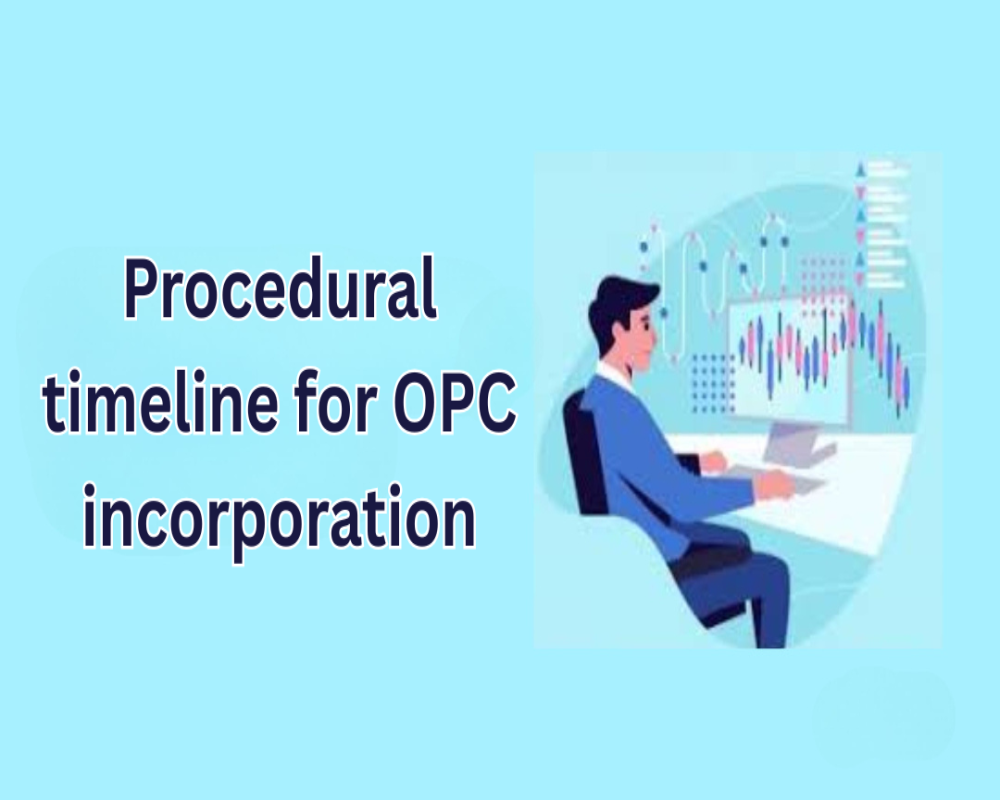Introduction
Incorporating a One Person Company (OPC) in India is a structured and streamlined process governed by the Companies Act, 2013 and administered by the Ministry of Corporate Affairs (MCA). The OPC model is specifically designed for individual entrepreneurs seeking limited liability and corporate recognition without involving multiple shareholders. While the process is relatively simple, it follows a well-defined series of steps, each with its own timeline. This article outlines the complete procedural timeline for OPC incorporation, highlighting each phase from preparation to the issuance of the Certificate of Incorporation (COI).
Step 1: Procurement of Digital Signature Certificate (1–2 Days)
The first step in incorporating an OPC is to obtain a Digital Signature Certificate (DSC) for the proposed director and nominee. The DSC is required to sign online forms submitted to the MCA portal. This typically takes 1 to 2 working days and involves submitting proof of identity, address, and photographs.
Step 2: Director Identification Number (DIN) Allotment (Simultaneous with Incorporation)
The Director Identification Number (DIN) is a unique identification issued to the proposed director. For OPCs, DIN can be applied through the SPICe+ (Part B) form during the incorporation process. There is no need for a separate filing, and the DIN is allotted automatically upon approval of the incorporation form.
Step 3: Name Reservation Using SPICe+ Part A (1–2 Days)
The next step is reserving the proposed company name through SPICe+ Part A. The name must comply with MCA’s naming guidelines and include the suffix (OPC) Private Limited. Once submitted, name approval is generally granted within 1 to 2 working days, provided the name is unique and free of conflict.
Step 4: Preparation of Incorporation Documents (1–2 Days)
Upon name approval, applicants prepare the required documents, including:
- Memorandum of Association (MOA)
- Articles of Association (AOA)
- Nominee consent (INC-3)
- Director’s consent (DIR-2)
- Declaration and affidavits (INC-9)
This stage usually takes 1 to 2 days, depending on how quickly the applicant gathers and digitally signs the documents.
Step 5: Filing SPICe+ Part B, AGILE-PRO-S, and Linked Forms (1 Day)
After document preparation, the applicant files the incorporation forms online:
- SPICe+ Part B for company details
- AGILE-PRO-S for PAN, TAN, GST, EPFO, ESIC, and bank account
- e-MOA (INC-33) and e-AOA (INC-34)
- INC-3 for nominee
All these are submitted together in a single workflow. Filing can be completed within a day if all documents are ready and correctly filled.
Step 6: Verification and Approval by RoC (2–3 Days)
Once the forms are submitted, the Registrar of Companies (RoC) verifies the application and documents. If everything is in order, the RoC issues the Certificate of Incorporation (COI) along with PAN and TAN within 2 to 3 working days. If corrections are required, the RoC may send it back for resubmission.
Step 7: Receipt of Incorporation Documents and Credentials (Same Day as Approval)
On approval, the applicant receives:
- Certificate of Incorporation
- Company’s PAN and TAN
- DIN confirmation for the director
These are shared electronically and are valid for commencing business activities immediately.
Step 8: Post-Incorporation Compliance (7–10 Days)
After incorporation, the OPC must:
- Open a bank account using the COI and PAN
- Deposit paid-up capital
- Issue share certificate
- Maintain statutory registers
This process may take 7 to 10 days depending on the bank and administrative readiness of the entrepreneur.
Conclusion
The procedural timeline for incorporating a One Person Company in India typically ranges from 7 to 10 working days, assuming no major delays or objections. Each step—from DSC procurement to RoC approval—has a defined purpose that contributes to the legal and functional establishment of the company. By following this structured process, individual entrepreneurs can enjoy the benefits of a corporate identity with full control, limited liability, and ease of business operations. The OPC model, supported by an efficient incorporation framework, continues to be a robust choice for solo business founders across sectors.
Hashtags
#OPCIncorporation #BusinessSetup #Entrepreneurship #StartupJourney #CompanyFormation #LegalProcess #BusinessRegistration #OnePersonCompany #OPC #IncorporationTimeline #SmallBusiness #BusinessPlanning #EntrepreneurLife #StartupTips #BusinessLaw #CompanyRegistration #OPCAdvantages #BusinessGrowth #LegalRequirements #IncorporateNow


0 Comments